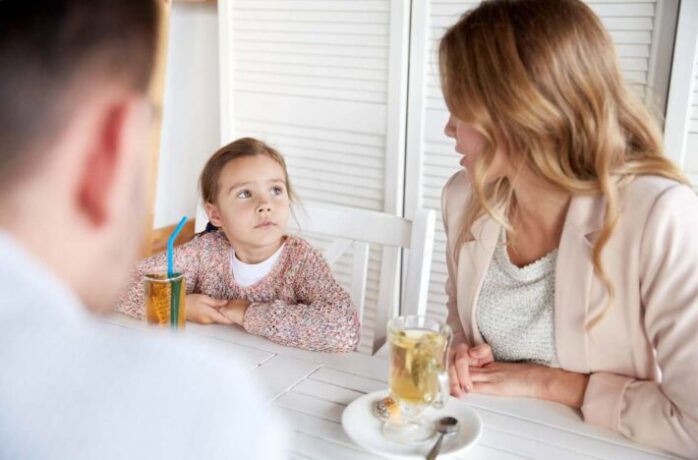
Unfortunately, in many cases, filing for a divorce is the only way out of a destructive impasse that has developed in the relationship of a married couple. Divorce can be psychologically gruelling and often painful, but sometimes it is the only alternative left for two people in a bad marriage.
This is the law of human relationships. If a marriage isn’t working, a couple has a legal right to seek a divorce. But not every family is just a married couple. Oftentimes, a divorcing couple has children. So how do you competently deal with the other members of the family when getting a divorce, especially the youngest and the most emotionally vulnerable?
There is a popular notion that children are the glue for a shaky marriage. Indeed, in family relationships that are not bound by obligations to children, it is much easier to make an important decision when the situation begins to seem hopeless to you. When there are children involved, your responsibility to your children help you to carefully assess how spontaneous and impulsive the decision to end the marriage may be.
We know that talking to kids about divorce can become a difficult task. Explaining divorce to a child is a multi-variable equation, but a clear plan of thoughtful actions, as well as diplomacy and tolerance, will help to cope with this test with dignity. The practical recommendations outlined below will be useful in your difficult situation.
Be confident in your intentions!

Just like any disease, a crisis in family relationships requires a quick response and appropriate treatment, otherwise the problem can turn into a chronic one. Having decided on a divorce, you should not delay the implementation of the plan, because postponing the final resolution you can complicate the situation even more.
Children can be a deterrent and a ghostly reason for trying to save a family that is destroyed by a lack of understanding from the inside. Before trying to glue together the small fragments of your shattered marriage for the sake of the artificial well-being and psychological comfort of your children, try to walk in their shoes and weigh the pros and cons.
Think about what is worse – to remain in ignorance and live in constant pretense on the part of your inner circle, or to own all the information, accept the unpleasant truth, realize the situation, and begin to learn to live with real facts. The second option may seem too cruel to children, but in reality it is the more responsible, balanced, and rational position of a good parent.
An acute illness often requires emergency surgery, and in the case of divorce, how you handle the situation will have a lasting effect on the children. Recognize the need for an important conversation with your children as soon as possible, and before doing so, discuss the best way to tell your kids about the divorce with your spouse. The conversation will go much better if the children are hearing it from both parents and understand that it is a mutual decision.
Don’t underestimate your kids’ feelings!

Family subordination is an important component of the relationship between family members, but it should not cross conditional boundaries under any circumstances. To get through this critical situation in the best way possible, mutual respect between all participants in the process will help!
Your children cannot be an exception to the rule. They are full members of your family who have every right to know what is happening to their parents and how this can affect their future lives. In no case should you leave the child alone with the existing situation. The support of both parents during this period becomes especially valuable.
Keep in mind, that in order to file for a divorce and qualify it as an uncontested case, you will need to have a mutual agreement with your spouse on all the points that may cause legal disagreements during the process, points out completecase.com. This agreement may also include contract clauses that relate to parental obligations and support for the children.
For a child, especially one at a younger age, it is very important to understand that the divorce process is not the final point in the relationship with their mom and dad. Reinforce this idea with your children. Explain to them that you will remain their parents even after the divorce is complete.
Be patient and tolerant with your children, as such a difficult issue can be hard for them to come to terms with and understand. Throwing someone into the river who is just learning to swim is far from the best way to balance the problem. Keep using the pronoun “we” when it comes to your family! On a subconscious level this will give the children a sense of support and care when talking to them about the divorce.
Be honest with your kids and with yourself!

Be prepared for the fact that your children can react very sharply to what is happening. It’s very difficult for children to handle any troubles within the family. Your children may show excessive emotions, or vice versa – become locked into themselves, feeling depressed and alienated.
Of course, no one knows your children better than you. And nobody can predict what information may be acceptable to them and what news can hurt them better than you. However, in no case should you try to hide from your children what is actually happening. Children will eventually figure it out on their own. It would not be wise to leave them to their own devices to draw their own opinions of the situation. This could be very counterproductive and could cause deeply rooted feelings of resentment that may be impossible to reverse.
Decide on your own strategy for how to tell kids about the divorce and speak with them on equal terms! If they ask questions, answer them. If they want to know the reasons for the divorce, tell them. Explain your decision and talk about the situation in simple language, honestly, openly, and without the use of compound metaphors and verbal constructions. It is important for kids to understand why such a problem happened in their family.
Obviously, it is not going to be easy to explain this dramatic change in your family to your children. Most likely the divorce was the result of many problems that accumulated over time; some may have even started out as small or insignificant then just grew over time. So before you decide how to explain the divorce to your children, start by being honest with yourself! Careful introspection and analysis of the situation will help you find the right words for communication with your children.
Be a responsible parent!

Having learned the shocking news about their parents’ divorce, the children may become confused and scared. In their minds they may be thinking that they will now have to choose between their parents. It is in your power to protect them from the need to choose between two parents and save them from the torment of such a choice.
An important message that must be made clear not only to your children, but also to you and your spouse, is that both spouses are equally and mutually responsible for the current situation. This mutual responsibility will give the children the courage to accept the situation and understand that neither parent is the “bad guy” that broke the family.
This means that in order to minimize the stress of your children, you should not use categorical statements and accusations against the other spouse in their presence. Your harsh statements about each other will serve no purpose other than the senseless and cruel manipulation of your children’s feelings. Remember that you can divide your joint material property, but joint children will continue to need care from both parents.
Never use wording like “your awful father left us!” or “your mother doesn’t do her job well enough!” Just try to realize that your children are not an instrument of blackmail and are not a bargaining chip in a sick game of psycho-emotional behavior in a bloody court battle with your spouse.
In the event that you are the parent of not one but several children of different ages, bring them all together in order to report this important news about the reform of your family. Do not discount the participation of the youngest members of your family, as this could make them feel less important or put them at an emotional disadvantage. It is important that both parents are present at such a meeting and each of them speaks on the topic. This will give children a more comfortable entry into the situation.
In conclusion, it is worth recalling the most important message that you can convey to your children in this difficult time. More than anything, you must convince the children that in spite of the critical situation your family has found itself in, they still remain the beloved children of both parents.
Children do not have to be a mirror image or a copy of their parents, but they subconsciously adopt the role and behavioral models on which the relations of elders are built. A timely heart to heart conversation with your kids in the right atmosphere will help save your children from repeating the same stupid mistakes of their parents in the future!











